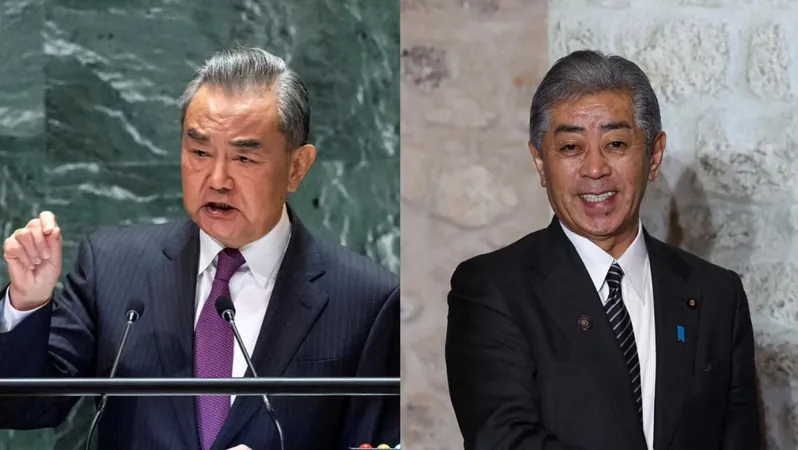
Crucial Talks Between China and Japan on Seafood Trade Amid Rising Tensions
2024-12-25
Author: Siti
BEIJING: Japan's Foreign Minister, Takeshi Iwaya, is set to visit China on Wednesday (December 25) for discussions that will focus significantly on the seafood trade. This important meeting comes after a tumultuous period in relations between the two nations, particularly following China's complete ban on Japanese seafood imports due to Japan’s controversial discharge of treated radioactive wastewater from the Fukushima nuclear plant.
This visit marks Iwaya's first trip to the Chinese capital since he took office in October. He is expected to meet with China’s Foreign Minister Wang Yi as well as other high-ranking officials to discuss bilateral issues and pave the way for future cooperation.
A significant hurdle in Japan-China relations has been the Fukushima discharge, which Beijing vehemently opposed, leading to stringent inspections of Japanese products. China imposed the seafood ban in August last year, escalating tensions after Japan began releasing treated radioactive water. However, in a hopeful sign, both governments reached an agreement in September to explore the possibility of resuming seafood shipments from Japan to China. There have been recent reports indicating that China might reconsider its ban on Japanese seafood imports.
Nevertheless, China seeks firm assurances from Japan to uphold its commitments regarding a long-term international monitoring framework for the wastewater. Beijing wants to ensure that stakeholders, including itself, can perform independent evaluations of the treated water. A spokesperson from China's foreign ministry reiterated that once adequate monitoring is established, the country would “adjust relevant measures” to gradually reinstate imports that comply with established standards.
The backdrop of these discussions illustrates a critical juncture in the deeply intertwined yet complicated relationship between China and Japan. This one-day visit follows a recent agreement between the two nations' leaders to bolster their strategic relationship, emphasizing collaboration. Chinese President Xi Jinping underscored last month during a meeting with Japanese Prime Minister Shigeru Ishiba that both nations should aspire to be “partners, not threats,” highlighting an essential pivot towards cooperation amidst historical tensions.
In addition to trade, Iwaya may bring up concerns regarding increasing military activities by China near Japan, as well as issues related to North Korea. Japan has recently expressed alarm over North Korea's security partnership with Russia, which is believed to potentially provide the North with advanced military capabilities. Reports indicate that North Korea has dispatched approximately 12,000 troops to assist Russia in its ongoing conflict in Ukraine, triggering grave concerns in Japan and the international community.
On a more positive note, the talks may include discussions on visa policies, with China recently extending its visa-free policy for Japanese citizens until the end of 2025—a program that had been suspended during the pandemic. This move is part of China’s broader strategy to enhance people-to-people exchanges, and there are hopes that Japan will reciprocate in kind.
As both nations stand at this critical moment, the outcome of Iwaya's visit could significantly impact future trade relations and diplomatic negotiations, setting the stage for either increased collaboration or renewed tensions in the region. Stay tuned for updates on this developing story.





 Brasil (PT)
Brasil (PT)
 Canada (EN)
Canada (EN)
 Chile (ES)
Chile (ES)
 España (ES)
España (ES)
 France (FR)
France (FR)
 Hong Kong (EN)
Hong Kong (EN)
 Italia (IT)
Italia (IT)
 日本 (JA)
日本 (JA)
 Magyarország (HU)
Magyarország (HU)
 Norge (NO)
Norge (NO)
 Polska (PL)
Polska (PL)
 Schweiz (DE)
Schweiz (DE)
 Singapore (EN)
Singapore (EN)
 Sverige (SV)
Sverige (SV)
 Suomi (FI)
Suomi (FI)
 Türkiye (TR)
Türkiye (TR)